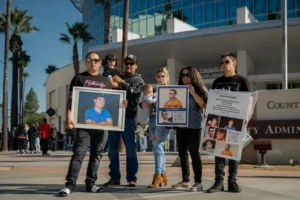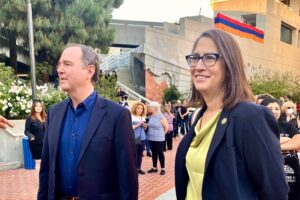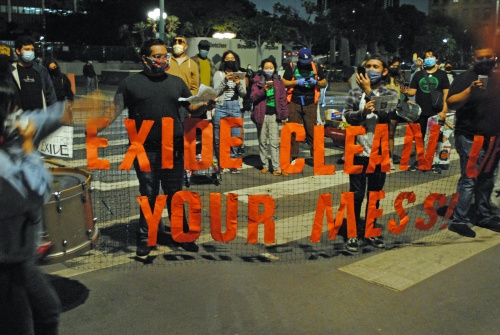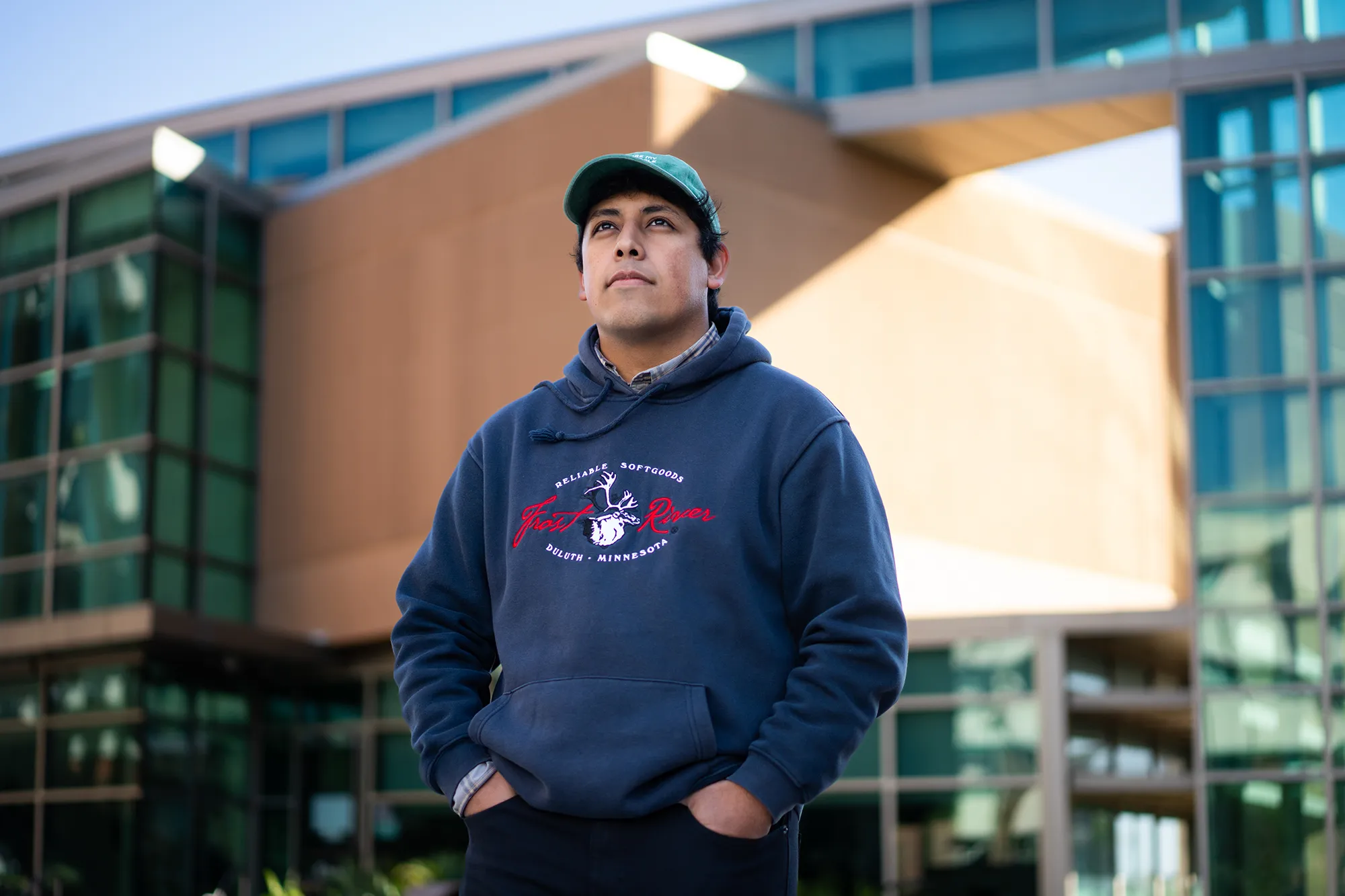By Jose Ivan Cazares
and Alfredo Santana
Contributing Writers
LOS ANGELES — Protestors demonstrated Oct. 19 in front of the federal courthouse downtown to protest a decision Oct. 19 that allows Exide Technologies to abandon its battery recycling plant in Vernon and saddle taxpayers with an environmental cleanup stemming from their pollution of surrounding communities.
Around 100 protestors marched from Mariachi Plaza in Boyle Heights to downtown L.A. beating drums and chanting, “When East L.A. is under attack, what do we do? Stand up fight back!” After reaching the federal courthouse, protesters threw bags full of soil “donated” by Exide from people’s contaminated yards onto the courthouse steps before dispersing around 9 p.m.
“Exide is a criminal polluter, and we’re not surprised that it will be the community that will be paying for this clean up,” said Laura Cortez, co-director of East Yard Communities for Environmental Justice, a Commerce-based community group that advocates for residents affected by pollution from the Exide plant.
“For us, that is not the end of the struggle.”
The battery smelting plant in Vernon was shut down in 2015 after Exide admitted to the illegal disposal, storage, shipment and transportation of hazardous material for more than two decades. The company reached a settlement that relieved it of any criminal liability. The Oct. 16 decision by the U.S. Bankruptcy Court of Delaware allows Exide to abandon the property and cleanup.
The U.S. Department of Justice and Environmental Protection Agency supported the settlement, but the state of California refused to sign on and Gov. Gavin Newsom condemned the decision.
A South Coast Air Quality Management District Health Risk Assessment concluded that as many as 250,000 residents within a 1.7-mile radius of the site face chronic health hazards from exposure to lead and arsenic emitted from Exide’s smelter and settling onto residential soil.
Cortez and several of the demonstrators said that because they don’t live within the 1.7-mile radius, their homes won’t be surveyed or cleaned despite calls from the public to expand the testing area to the surrounding 4.5 miles. Affected communities include Commerce, Maywood, East Los Angeles and Boyle Heights.
Nestor Enrique Valencia, a former Bell City Council member and current representative of the Bell Resident Club, expressed outrage at the court decision during the march.
“We, the Bell Resident Club and me as an elected official back then warned about trusting these people,” Valencia said. “The EPA screwed us by calling it a criminal act and not indicting anyone. These companies only learn when arrests are made, because they have all the money in the world to pay any fee.”
Groups like East Yard Communities for Environmental Justice have advocated on behalf of the communities affected by Exide’s pollution and recently promoted Assembly Bill 142, which expanded a pre-existing lead-acid clean up fund. Cortez said, however, that efforts like these aren’t enough to clean up communities that have been exposed to high levels of pollution for generations.
“There a lot of polluters that are allowed to get away with polluting because our government welcomes them thinking about the income they bring in to the community, but they don’t think about the long-term health impact or the deaths they cause, because the cumulative impact of these industries have caused asthma, lung cancer and other ailments for generations.”
Guadlupe Valdovinos spoke to the crowd during the Oct. 19 demonstration.
“A year ago, we found our property was still polluted,” Valdovinos said. “The soil was loose and [crews] told us the job was going to be completed. We found that our properties are not clean.”
Another speaker, Emily Castro, said as a youth she learned that 99% of more than 8,000 dwellings suffered from lead and arsenic pollution carried by wind from the battery-melting facility, and cited academic studies and independent research that conclude toxic levels in these communities are many times higher than what the state Department of Toxic Substances and Control considers safe for humans.
Castro said she lived a few feet from the 1.7-mile borderline and did not qualify for financial support to run the environmental test in her household, but a study conducted by USC in 2019 showed microparticles traveled further out during Exide’s nearly 30 years of operation in Vernon.
“After the ruling, I’ve learned that Exide has been downplaying [the calls] to clean lead found in our communities,” Castro said. “I also learned that Latino, Black and the indigenous [peoples] are mostly impacted by these injustices.”
Eastyard Communities for Environmental Justice member Miguel Ramos blasted the U.S. Department of Justice forbacking the bankruptcy court’s ruling, and also blamed state-elected leaders for being negligent and unprepared for a maneuvering that leaves California taxpayers hooked with the largest toxic cleanup bill in the state’s history.
More than $270 million have been spent testing and cleaning soil and other surfaces near the shuttered plant, while residents have reported a myriad of cancer cases caused by arsenic and lung, brain, dental and cardiovascular diseases due to lead particles.
Ramos prepared a cardboard with the legend “Dirtbags for Dirtbags,” in reference to what he called “special interests filling politicians’ pockets with campaign contributions.”
“It is disappointing that our communities get the end of the stick” as they would try to recover funds following secured creditors and investors, Ramos said. “It shows that the government does not care about our communities getting a settlement on these cases.”
Shouting with a megaphone, community organizer Alessandro Negrete demanded that Gov. Gavin Newsom do a case review, and order the state attorney general to file criminal charges against Exide’s current and former owners for abandonment of an environmental criminal enterprise.
“We call on Gavin Newsom to resolve this crisis,” Negrete said. “Our communities are tired of taking beatings and being polluted.
“What they said on the ruling is that they are done with Exide. We are here to remind them that we are not done until we are done with Exide.”
Jose Ivan Cazares and Alfredo Santana are freelance reporters for Wave Newspapers who cover the East Los Angeles area.











